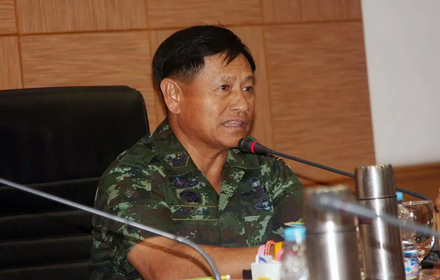A farewell interview with Lt-Gen Walit Rojanapakdee
Fourth Army Region commander, Lt-Gen Walit Rojanapakdee, appears to be media shy.

During his five-month stint in the restive Deep South, he rarely talked to the media despite the fact that in order to tackle the unrest problem which is tough nut to crack, one of the prerequisites is to communicate to create a better understanding with the society.
The Isra news agency had a rare chance to talk at length with Lt-Gen Walit recently when the 5th coordinating centre of the Internal Security Operations Command held a get-together between the military and the media during which the media was given a briefing of the southern situation from the commander.
From his opening statement, it was understandable why Lt-Gen Walit didn’t like to talk to the media.
"Sometimes when the media covered the news (of violent incidents), they were not as serious as portrayed by the media. They were sensationalized like the word "boem" (meaning explosion)which was often used. Would it be possible that the word be avoided because it gave a misleading impression that the situation was bad? May I beg that you media presented some positive news. When the incidents were sensationalise, they (separatists) rejoiced because they spent just a small amount of money and they got coverage on the front pages of the newspaper and the television. I understood that it was the media’s job but you should be careful too."
The commander admitted that he occasionally felt discouraged by media’s criticism.
"When I first assumed the post of the fourth army region. There were talks about whether I would be able to deal with the problem. That was very discouraging because I had not started working yet. I didn’t want to name which media but that was an insult. They should have given me some time. Since I took up the position, I have been working and carrying on with the work which was passed on to me. There was a heap of information. They came to me with the information and recommendations and I analysed them and work plans were hatched. Why couldn’t I do the job?"
He explained that the main job of the military and ISOC was to ensure the safety of lives and properties of the public. Jobs and responsibilities were delegated to the provincial, district and tambon levels in line with decentralization.
The district operating centres which were set up in every district in the three southernmost provinces to ensure safety in respective district down to the tambon level have been doing well, he said.
Besides the insurgency problem perpetrated by the separatist gangs, the commander blamed oil and contraband smuggling and drug trafficking gangs for complicating the unrest situation. But as far as the drug problem is concerned, he said that it was fortunate that the authorities had the full support of the local people and, therefore, the problem had been dealt with quite satisfactorily.
He said he had made clear to all officials that anyone of them who were involved in narcotic drugs would be punished and several were dealt with accordingly.
Asked about the occasional rumours that members of the security force perpetrated some of the violent incidents, Lt-Gen Walit said the military had a standard procedure to deal with rogue troopers or police, adding that their punishments are normally three times heavier than ordinary people.
Regarding peace talks which are to resume with separatist gangs, the commander insisted that the government’s position has always been along the following line – that is there is no territorial separation and the talks should lead to peace and sustainable development.
Asked about the speculation that he might be transferred out of the Deep South, Lt-Gen Walit replied: "I don’t know. You should ask my superiors. I have my duty to perform and I do my best. I cannot force my superiors to transfer or not to transfer me. When I am here, I do my best. Transfer or not is not the point. There is a clearcut policy, whoever who is transferred here will follow the policy. I don’t see there is a problem."
-----------------------------------------------------------------------------------------------------------------------
Caption : Lt-Gen Walit Rojanapakdee
Photo by Thanapat Kitjakosol
